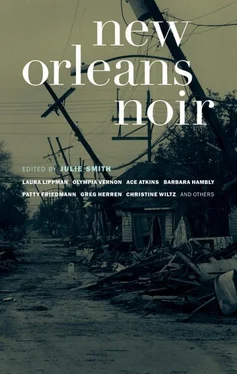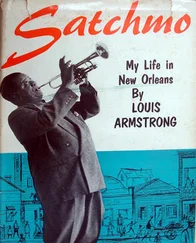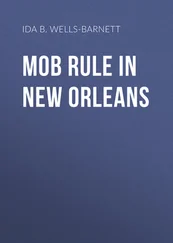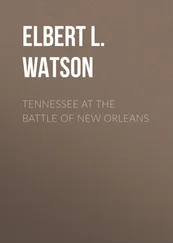“In a manner of speaking,” said January.
Returning to the room he rented from his widowed mother on Rue Dauphine, he carefully tore one of the front blank pages from Kentucky Williams’s Bible, meticulously matching the irregularities of the ragged remains of the torn page in the back. It took him a little experimentation with watering ink to achieve the faded hue of the original. While his various samples were drying, he set to work with the Bible to code a new message, using for good measure as many of the letters as had been in the original’s first three lines, which he’d taken the precaution of copying.
“My guess is, those are all that Porter read, if he even read that far,” he said to Hannibal that night, when he walked out to the Broadhorn to check on his two patients. “If anything sticks in a man’s mind out of a mass of numbers like that, it’ll only be the first few. Which is the reason, of course, for a code in the first place.”
“Did you figure out what them first lines said?” Delly asked, her brown eyes round in the grimy lamplight of her attic cubicle. “Does it say where the treasure’s hid?”
“It does.” January tied up the clean dressing, gently tugged the girl’s ragged nightdress back into place. “The first three lines — and, I suspect, the rest of the coded text — are names, clearly invented. Jack Falstaff is one; Montague Capulet is another. Beside each name is the name of a bank.”
Delly frowned at this prosaic anticlimax — she’d clearly expected paces counted from Death-Head Oak and Skull Rock.
But a slow grin spread over Hannibal’s thin face. “Where Uncle Water Buling cached whatever he could make off with under Wilkinson’s nose, in the confusion of Burr’s projected invasion. How many of those banks are still in operation, do you suppose? Private banks come and go like waterfront cafés.”
“Which would be why Uncle Walter spread the funds out among so many. The first on the list is the Bank of New York, and that’s still in operation. So Kentucky will get at least a little money out of it.”
“Which she’ll probably drink up within a week,” sighed Hannibal. “I would, anyway. It does seem a waste.”
Screams resounded from the yard below, followed by shots and the crash of a body being heaved out the Broadhorn’s back door. Both men and Delly tilted their heads toward the window to ascertain that it was only a fight between six or seven customers, clawing and gouging in the mud of the yard while Kentucky Williams roared curses at them from the porch.
“It does,” January agreed. “But if we do more than take a reasonable sum for services rendered, on the grounds that as upstanding citizens we deserve the money more than she does, how does that make us different from the man who slashed up Delly with a knife?”
The next morning, January took delivery of the code paper, and spent until early afternoon closeted up with the Bible, deciphering names. “I’d like to get this back to the saloon before it opens,” he said to Hannibal, who had put in an appearance — at a far earlier hour than was usual for him to be about — to assist. “The doctor I talked to said Porter’s wounds weren’t deep. He should be able to use his arm by this evening. It would be a shame if the book isn’t there when he makes his next attempt.”
Right on schedule, that evening, while January was again changing Delly’s dressings, a tumult of shouting and two shots resounded from the saloon below, followed a moment later by Hannibal’s arrival at the top of the ladder.
“He’s downstairs,” gasped the fiddler, panting from just the climb. “Done up as a preacher in the most ridiculous wig and false whiskers you’ve ever seen.”
“Who got shot?” January asked, scrambling down the ladder after Hannibal, crossing to the porch at a run.
“Nobody — but Porter went down with what I assume to be chicken blood all over him like an Indian massacre.”
They sprang up the porch steps and peered through the Broadhorn’s back door in time to see a tallish, thin man in the shabby black suit of an impoverished minister lying, gasping theatrically, on the floor among a half-dozen kneeling ruffians. His hands and gray-whiskered face were covered with gore in the saloon’s dim lamplight.
“I’m dying! Oh, I’m dying! For the love of God, is there a Bible in this house?”
As Williams promptly fetched the Holy Writ from where January had stowed it earlier under the bar, Hannibal and January traded disbelieving glances. “I’ve seen better acting at Christmas pantomimes,” Hannibal whispered.
The allegedly dying alleged preacher clutched the volume to his ensanguined chest and sobbed, “Bless you, my daughter—”
And with a crash, the lights went out.
“Two accomplices,” reported Hannibal softly, as he and January stepped aside to let three blundering forms spring through the door between them and sprint away across the yard.
Inside the saloon, men were crashing around and cursing; a moment later a match flared, and someone exclaimed, “Fuck me, where’d that preacher go?”
“Not badly done, though,” added the fiddler, as he and January strolled back to the ladder. “Kentucky’s promised us each ten percent of whatever we can retrieve from those bank accounts, and twenty percent for Delly, which is very generous of her. I’ll write to the Bank of New York tomorrow. I suspect that our friend Mr. Porter’s in for a very frustrating few months, writing to banks that no longer exist about accounts whose names he doesn’t have right.”
“Oh, I didn’t substitute names,” said January. “A man who considered it his right to carve up a saloonkeeper and a completely innocent black girl — who’s going to be scarred for the rest of her life — deserves more than a little frustration. No, I wrote up a very elaborate treasure map leading to an island in the middle of the swamps below Villahermosa in the south of Mexico; a friend of mine in Paris who’d been a doctor in the French Navy under Napoleon told me about it. He said nine-tenths of their men came down with fever there and most of them died. A land wrought by Satan, he said, to punish sinners.”
Hannibal’s eyes widened. “Do you think he’ll go?”
“He will if he wants the four hundred and fifty thousand dollars in Spanish gold I said was buried there.”
“Considering the amount of money he’ll have to borrow to finance an expedition,” mused Hannibal, “and the time it will take, and the gnawing anxiety of knowing there’s a treasure just waiting for him...”
“If he’s willing to seek it,” said January gently. “Which we know, from his actions, that he is. Where your treasure is — wholly imaginary, in this case — there shall your heart be also ... and for Mr. Porter, almost certainly his fever-ridden bones as well.”
Hannibal paused, his hand on the rungs of the ladder. “For such a thoroughly nice man, Ben, you can be a complete son of a bitch.”
“Thank you,” said January. “I have my moments. Now let’s start writing those letters to the banks, and see how much of the real treasure is left to collect.”
Muddy pond
by Maureen Tan
Village de l’Est
On the Wednesday after the levee failed and flooded New Orleans East, sixty-eight-year-old Sonny Vien waded into chest-deep water to rescue the Virgin Mary.
The two-foot-tall statue was at the far corner of the house, near where the front yard met the side yard. It was sheltered by a stone grotto that Sonny had built and surrounded by a garden that his wife, Tam, had planted. Climbing red roses framed the grotto and tiny white flowers formed a carpet at the Virgin’s feet. In a perfect blending of New Orleans tradition and Vietnamese-Catholic belief, they had positioned the grotto so that the Virgin’s back was to the house while her delicate Asian features and outstretched arms were directed toward the not-too-distant levee.
Читать дальше












